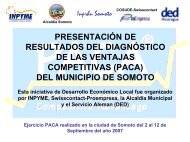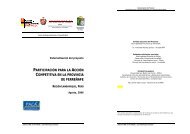OECD Culture and Local Development.pdf - PACA
OECD Culture and Local Development.pdf - PACA
OECD Culture and Local Development.pdf - PACA
Create successful ePaper yourself
Turn your PDF publications into a flip-book with our unique Google optimized e-Paper software.
1. USING A TERRITORY’S CULTURE TO PROMOTE LOCAL DEVELOPMENT<br />
preferred to convert its old factories to house its new activities, rather than<br />
demolish them); development of mutual support networks; introduction of<br />
institutions that associated education closely with technological culture, as at<br />
Chivasso; greater attention to workers with a degree of seniority who could take<br />
on new activities; revival of knowledge <strong>and</strong> know-how, for example, in the<br />
moviemaking <strong>and</strong> audiovisual fields.<br />
The second has to do with fairly diversified industrial settings. While there may<br />
be a dominant technology or activity, there is a capacity to adapt, so that new products<br />
<strong>and</strong> services can be steadily created. The entrepreneurial culture here is one of<br />
adaptation <strong>and</strong> responding to challenges associated with the necessary shift to new<br />
activities or technologies (as in Liège, Nottingham or St. Etienne).<br />
The North Rhine-Westphalia region, long a byword for European industrialisation,<br />
provides a good illustration of this culture <strong>and</strong> the way it has changed to the benefit<br />
of local development. The region is no longer on the list of the big European<br />
steelmaking, chemistry, mining <strong>and</strong> pharmaceutical concerns, <strong>and</strong> workers<br />
themselves no longer see their job security as dependent on a single big company.<br />
Whereas there were some 600,000 SMEs in the region 20 years ago, there are now<br />
2.4 million.<br />
The entrepreneurial culture is not tied to a single industry, <strong>and</strong> it strives to adapt<br />
to new technological <strong>and</strong> financial conditions, while also stressing the importance<br />
of business services. <strong>Local</strong> discussion forums, such as the one at Oberhausen (Forum<br />
for the Future of SMEs), are giving expression to needs <strong>and</strong> putting forth proposals<br />
that take quality as a basic objective. <strong>Development</strong> corporations combine the<br />
activities of the former municipal business services <strong>and</strong> the interests of private<br />
enterprises to offer new services <strong>and</strong> to foster entrepreneurship. “One-stop<br />
shops” have been created for new entrepreneurs. Networks that offer themselves<br />
as alternatives but that can in fact provide an entree to the mainstream have been<br />
organised (such as the Netz für Selbstverwaltung, “Network for Self-management “).<br />
They enlist alternative enterprises, organised most frequently as cooperatives -<br />
retail stores h<strong>and</strong>ling ecological products, bicycle repair shops, equitable insurance<br />
offices, messaging services, environmental consulting firms, retail stores - in<br />
cooperation to promote sustainable development.<br />
Beyond these variations, there is a cultural vision that embraces a few fundamental<br />
principles: associating workers with the decision-making process, ensuring a<br />
sustainable environment regardless of the business activity, or providing on-thejob<br />
worker training.<br />
The third variety of entrepreneurial culture is to be found in rural areas, which<br />
will differ from each other depending on whether they are home to industrial<br />
34 CULTURE AND LOCAL DEVELOPMENT - ISBN 92-64-00990-6 - © <strong>OECD</strong> 2005














